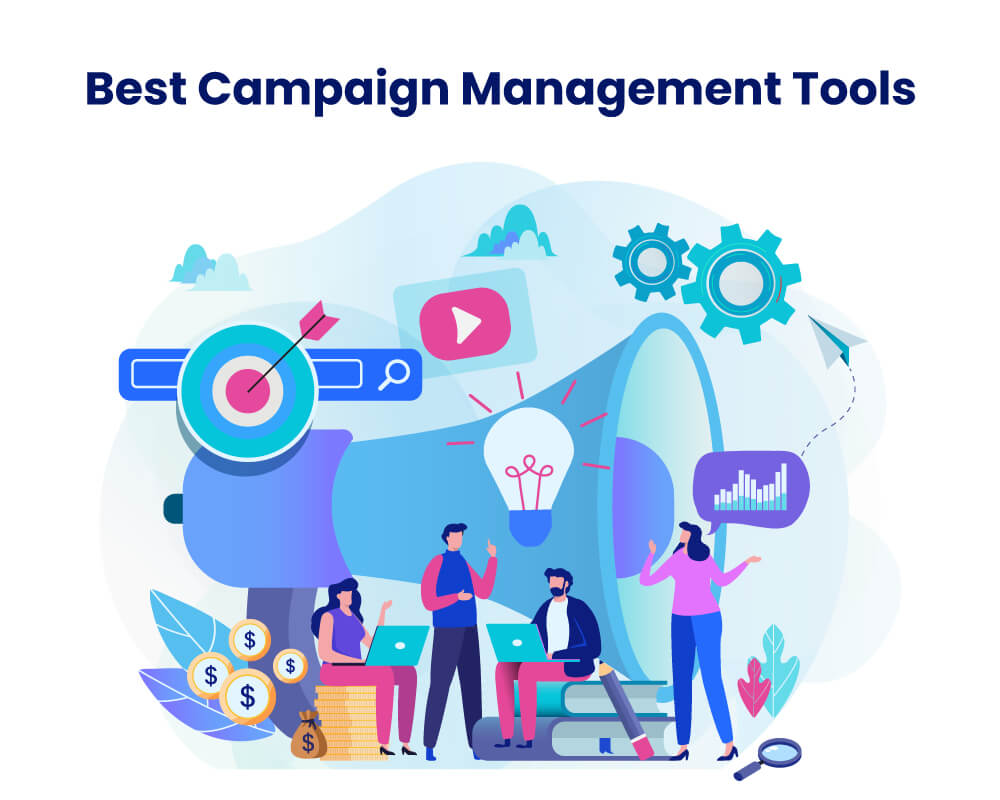
Planning campaigns can be intricate and complex. While running a marketing campaign, a brand takes a set of pre-planned actions to achieve a goal. The goal can be increasing sales, or brand visibility, or reaching out to a new set of audience. However, campaigns are not just the act of posting advertisements. It also involves managing ads, tracking how they are performing, and how people are reacting to them. Managing campaigns and monitoring all these metrics manually can be taxing. But you can easily achieve your sales and marketing goals by using campaign management tools.
If you see, marketing campaigns can be both offline and online. For instance, you can stick poster ads on the New York subway as well as on post the same creative on your brand’s Instagram page. A brand can also run campaigns via the brand website, emails, and blog posts. Examples of marketing campaigns include Nike’s “Just Do It” or Dove’s “Real Beauty” campaign. However, campaigns need not be advertisements always. Dominos, for instance, with its Points for Pies campaign, leveraged technology to reward its customers.
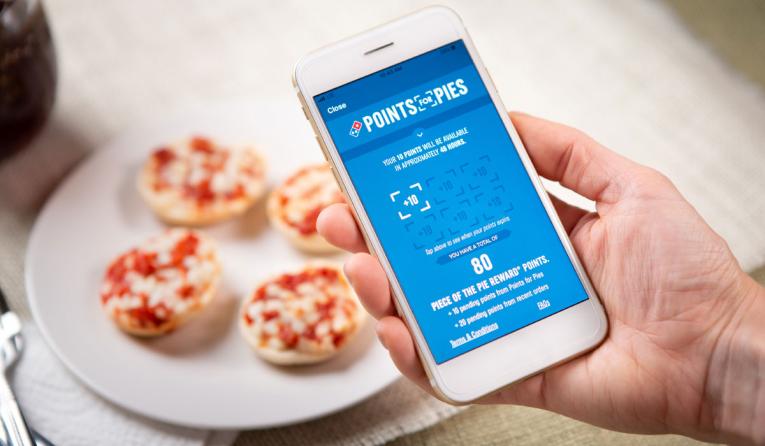
A marketing campaign needs to have specific goals. It could be something that helps to:
- Promote a product or a service
- Increase brand awareness and visibility
- Gather feedback and boost user engagement
- Generate new revenues from existing customers
- Or, something as basic as lead generation.
There is no definitive list, in fact. These marketing drives can take place for various reasons. But, even a single campaign can have a lot of moving parts. So, to successfully plan, execute, and measure your campaigns, you need a robust software solution.
While there is a campaign manager to manage the entire campaign, it also requires some essential software tools. Campaign management tools are crucial to ensure its success. These tools are quite diverse. There is no one-size-fits-all solution. Some tools help with running email campaigns, while some help with gathering customer feedback. It may also include project management and customer relationship management products.
So let’s evaluate different campaign management tools and the purpose they serve.
Email Tools
Emails are one of the most effective channels of communicating with customers. Almost 90% of sales and marketing people use emails for communication and promotion.
Email marketing is therefore an essential aspect of campaigns. They are also the most fundamental forms of digital marketing, where you can target a specific audience. When individuals subscribe to emails, they are genuinely interested in the brand. Therefore, it is a good option for brands to invest in email marketing. Following are some of the tools that help in sending/scheduling email campaigns.
1. Sender
Sender is an email and SMS marketing platform ideal for both B2C and B2B marketers who need an affordable tool to set up their campaigns. The omnichannel marketing automation platform allows you to effectively combine email and SMS marketing from a single dashboard, so you won’t need to switch between the apps constantly.
The tool’s pre-made templates and drag-and-drop design builder help you create stunning popups, forms, and newsletters to grow your customer base and further engage your subscribers. On top of that, Sender integrates with top CRMs, ecommerce platforms, and content management systems (CMS), including Shopify, WordPress, WooCommerce, and PrestaShop. It also provides real-time reporting and analytics, allowing you to track crucial email and SMS metrics.
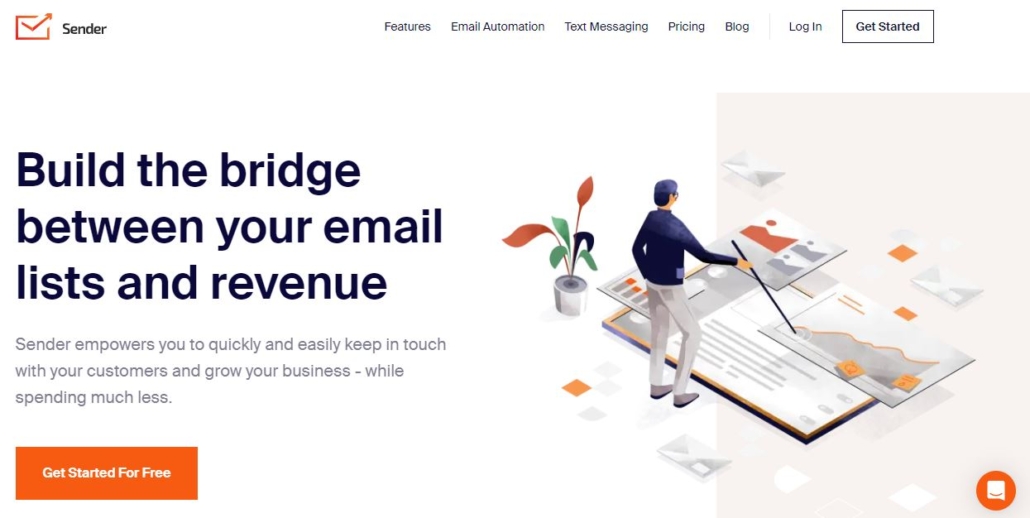
2. SendX
SendX is a comprehensive email marketing tool known for its exceptional high deliverability rates and the ability to manage vast volumes of emails. Its robust suite of features, including an intuitive email editor, advanced tagging and segmentation, and powerful automation capabilities, enables you to create engaging and targeted campaigns with ease. Alongside this, SendX supports CSV file imports for seamless list management, and its automation and drip campaigns ensure you effectively nurture subscribers through every stage of their journey.
It also boasts a rich library of customizable, mobile-friendly email templates and half-a-million free images to create visually striking emails. SendX integrates smoothly with popular apps, enhancing workflow efficiency without causing any hassle. It comes with a 14-day free trial to make it a choice worth considering for all email marketers aiming for high inbox landing rates and streamlined operations.
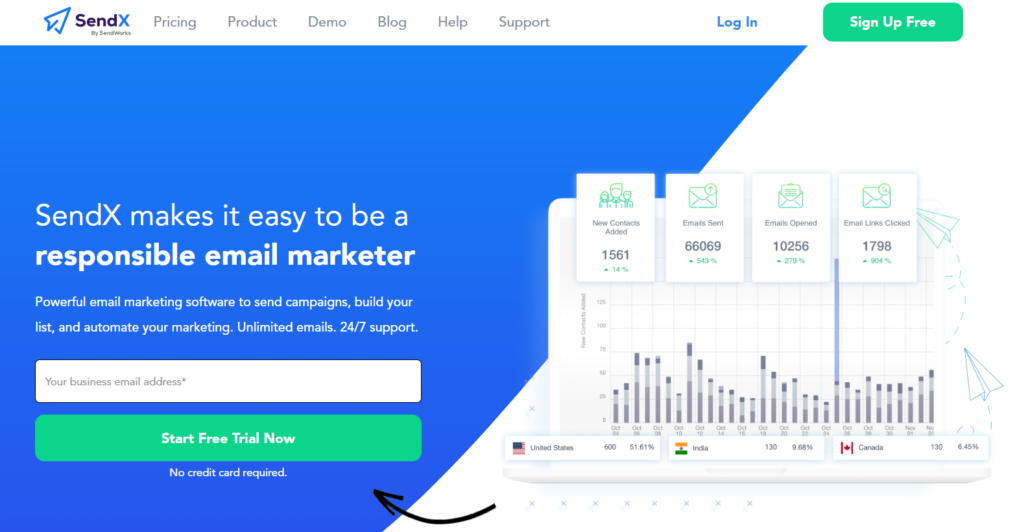
3. MailChimp
MailChimp is a well-known marketing platform. It comes with a drag-and-drop email editor that one can use to make visually appealing emails. It also has features like device optimization, A/B testing, to name some. Furthermore, there are also a lot of templates that can help you get the right email for the campaign without breaking a sweat. MailChimp is a great starting point for email campaigns as it comes with a free plan that allows brands to send mails to 2,000 contacts.
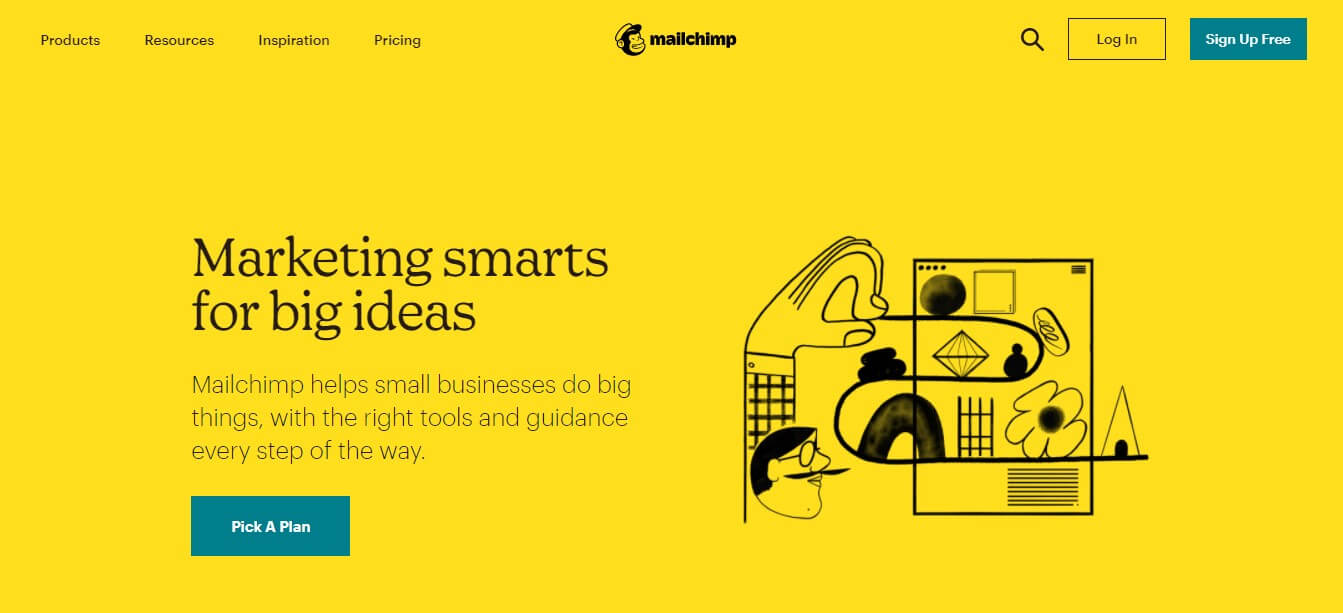
4. HubSpot
HubSpot is a campaign management tool that has a large client base. It has several email marketing features, such as drag-and-drop email designing, contact lists, A/B testing, and more. HubSpot also allows you to personalize emails and see how much each email has contributed to the revenue. HubSpot is much more expensive than MailChimp, but it comes with a complete marketing suite, in addition to emails.
Also read: HubSpot alternatives
5. Drip
Drip is a great email marketing tool for e-commerce. It allows you to see how customers interact with the email. It can integrate with popular stores, such as Shopify. Drip provides enhanced automation and analytics, and therefore you will know what email you want to send to a customer. This tool comes with a free trial that one can use to check it out.
These tools are beneficial if your current focus is only on email marketing. If email marketing is only a part of your marketing strategies, then you will need more than this. Brands generally use CRM suite for end-to-end marketing and sales automation, and email tools are usually a part of it. Also, many organizations explicitly integrate their email marketing tools with CRM for syncing sales and marketing teams.
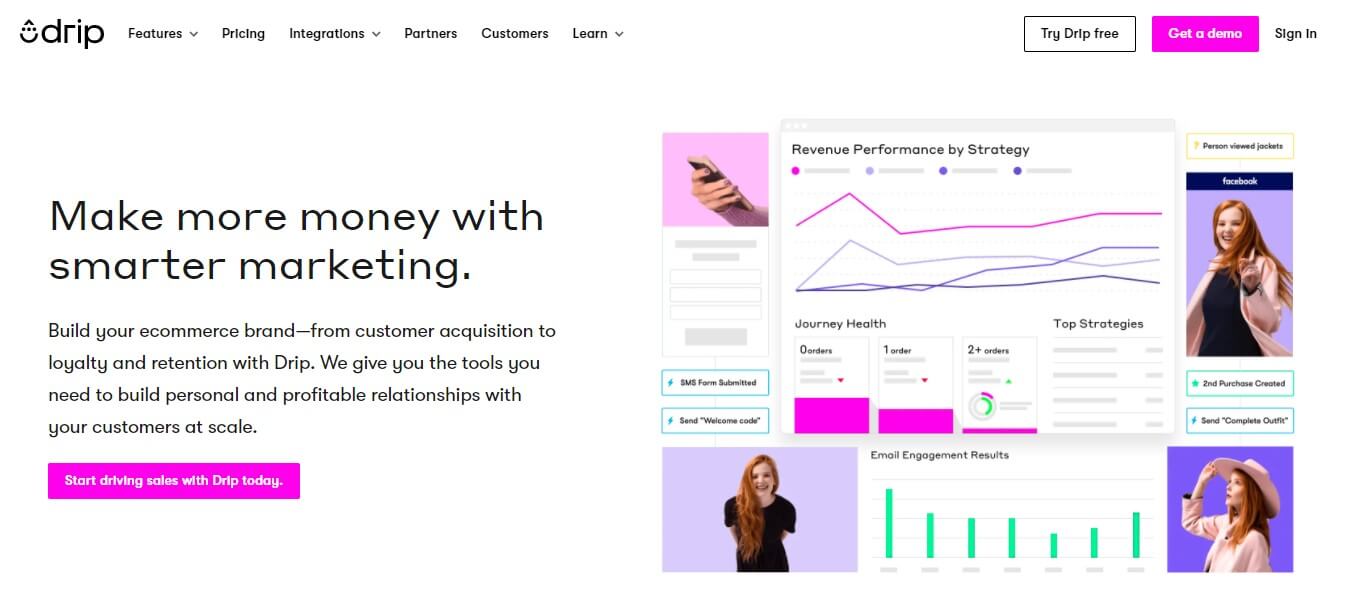
Also read: What should be there in your email marketing funnel?
CRM Tools
An essential part of every campaign is customer relationship management. Most larger businesses have software packages to handle CRM related tasks. Ideally, they help to keep the sales cycle smooth. The ROI from CRM software averages $8.71 for every dollar spent. Here are some well-known CRM tools that brands can use as campaign management tools.
6. LeadSquared CRM
LeadSquared Marketing and Sales Execution CRM is a newer and more modern option with email, marketing, and sales automation features. This tool incorporates the necessary technologies for zero lead leakage and quick turnaround. Furthermore, it allows the creation of flexible marketing and sales workflows, and a whole world of no-code customizations. It can also integrate with other apps and services like telephony, cloud calling, emails, social media, to name some. LeadSquared mobile CRM app is also a big hit among the organizations that have large field sales teams.
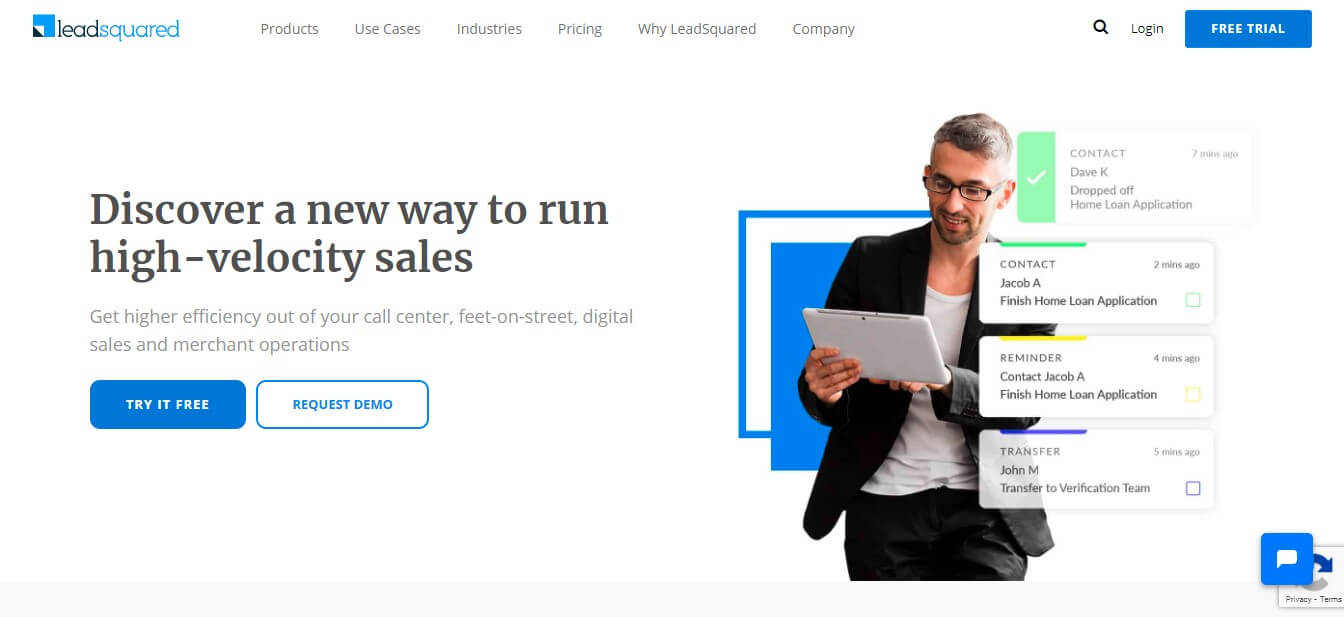
7. Salesforce
Salesforce has been the go-to CRM for many large organizations that do not have their own CRM solution. It is quite an evolved software that tracks the customer journey through the sales lifecycle. Salesforce supports extensive customization and has a separate marketing tool called Pardot. Several customizations, however, are partner dependent, increasing the go-to-market costs and TCO.
8. Zoho
Zoho is a popular web-based CRM. It allows pipeline management, lead tracking, purchase control, and more. Furthermore, it also connects to Google and Microsoft apps and even QuickBooks.
9. Streak
Streak CRM brings your leads into your emails and captures data from there. The app comes with different workflow flavors that you can choose. It also comes with tracking and scheduling features that one would require in a campaign.
Related: What is B2C CRM?

Advertising Tools
Advertising is a great way to get immediate ROI from your marketing campaigns. Nearly 27% of internet users say – they find new products and brands through Ads. Organic can be a part of your long-term marketing strategy, but advertising is crucial for the short-term.
The following are the types of digital ads that you can create using these platforms.
Google Ads
Google Ads lets you create and manage ads on Google platforms and partner networks. From a single platform, you can create and publish the following formats of ads:
- Search ads: text-based ads that appear on Google Search Engine
- Display ads: image, GIFs, video ads that appear on different websites
- YouTube ads: skippable and non-skippable video ads that appear on YouTube
Facebook Ads
When it comes to social media advertising, Facebook Ads is a great platform. It allows you to advertise on Facebook and Instagram with different ad placement strategies such as:
- Feeds: Facebook news feed, Instagram feed, Facebook Marketplace, video feeds, right column, Instagram Explore, and Messenger Inbox
- Stories: Facebook, Instagram, and Messenger stories
- Facebook in-stream videos
- Facebook search results
- Messenger sponsored messages
- Facebook instant articles
- External apps: Audience Network native, banner and interstitial, Audience Network rewarded videos.
LinkedIn Ads
LinkedIn is popular among professionals for networking. If you have a product for professionals and for other businesses (B2B), then LinkedIn could be a great choice. The following are the types of advertising possible in LinkedIn for your campaign:
- Sponsored content: single image, video, carousel ads
- Sponsored messaging: these are ads sent to a person through direct messaging with personalization
- Text and image ads: these ads appear on the right column of the LinkedIn pages
- Dynamic ads: it is useful to engage prospects with automated personalized ads.
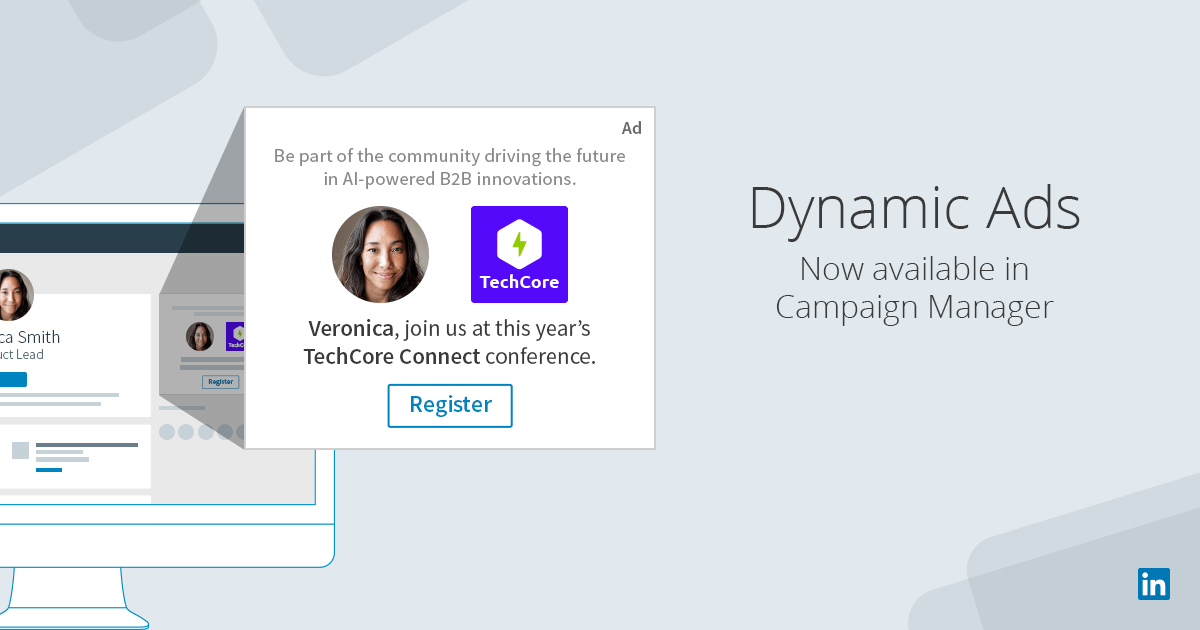
Here are the best tools for managing your digital advertising campaigns.
10. WordStream Advisor
WordStream Advisor is a platform to manage your Google, Facebook, and Microsoft Ad accounts from one place. It provides a cross-platform dashboard and allows you to drill deeper into key metrics and campaigns. You can also customize reports.
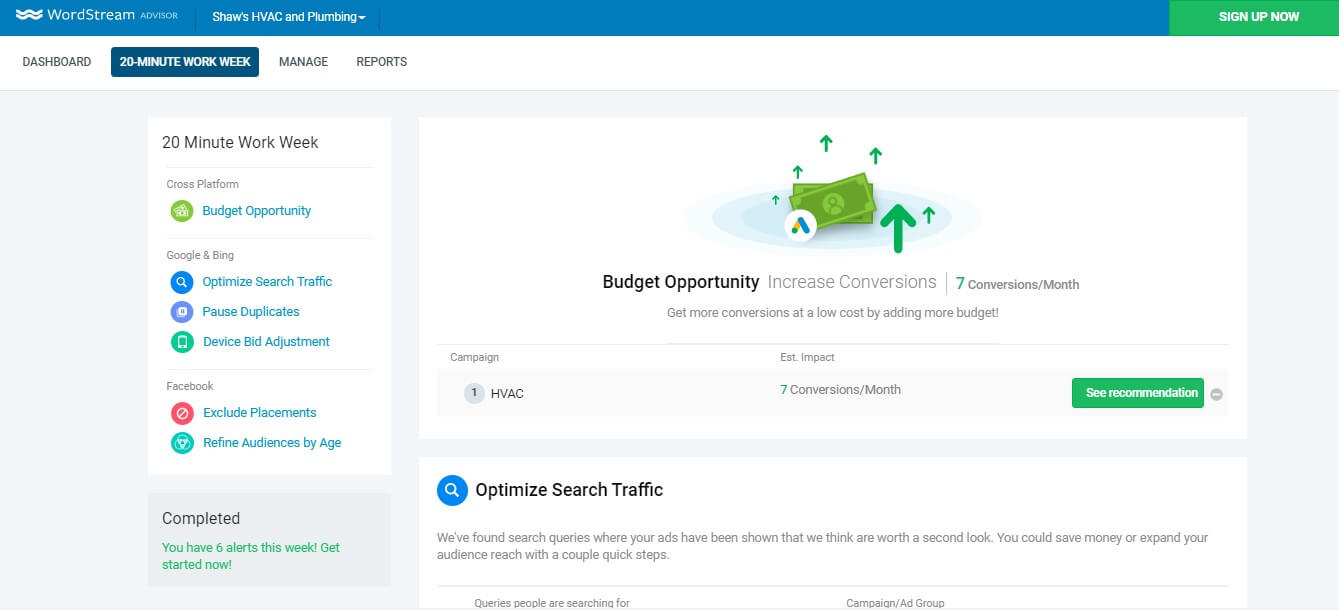
11. Madgicx
Madgicx is an omnichannel marketing platform for optimizing ads across Facebook, Instagram, and Google. The tool helps in Ad creation, provides creative insights, allows bidding and budget optimization, along with a reporting dashboard.
12. AdNabu
AdNabu helps optimize Google Ad campaigns for search, shopping, and display networks. This tool is especially beneficial for running and managing e-commerce shopping campaigns.
The best thing about digital ads is that you can segregate your audience based on their age, location, interests, gender, job, and more. However, most of the tools available are standalone platforms and subsets of campaigns. For instance, if you are in the e-commerce business and want to launch a Christmas holiday campaign, then you’ll probably use more than one campaign platform. You’ll be advertising on Google, Facebook, Amazon, and more. Now, if you want to measure the outcomes from different platforms in one place, then you’ll have to integrate these platforms with a central CRM system.
The following is an example of campaign analytics in LeadSquared CRM.
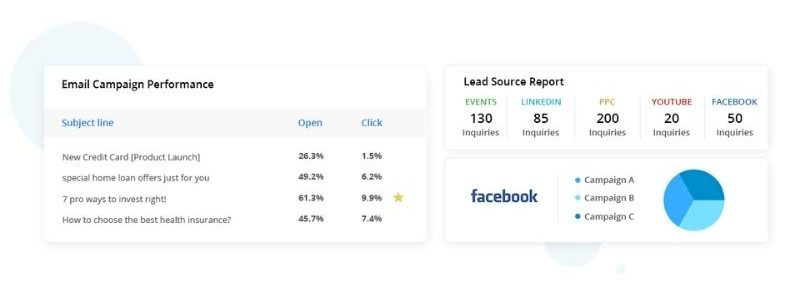
Project Management Tools
For effective campaign management, project management tools are also beneficial. It is a campaign management tool that works as a central hub. All assets, communications, and documents are under the same platform. Moreover, project management tools can help schedule and delegate tasks. So, if a simple to-do list is not cutting it anymore, a dedicated project management tool will help.
13. Hive
Hive is a comprehensive project management tool. It comes with numerous nifty features that will make campaign management a whole lot easier. Hive comes with native chat and email. It also integrates with a thousand other platforms and services. Hive allows project management using Gantt, Kanban, portfolio, or calendar views. It also has intuitive action cards and lets team members to upload files, provide feedback and approvals, and more.
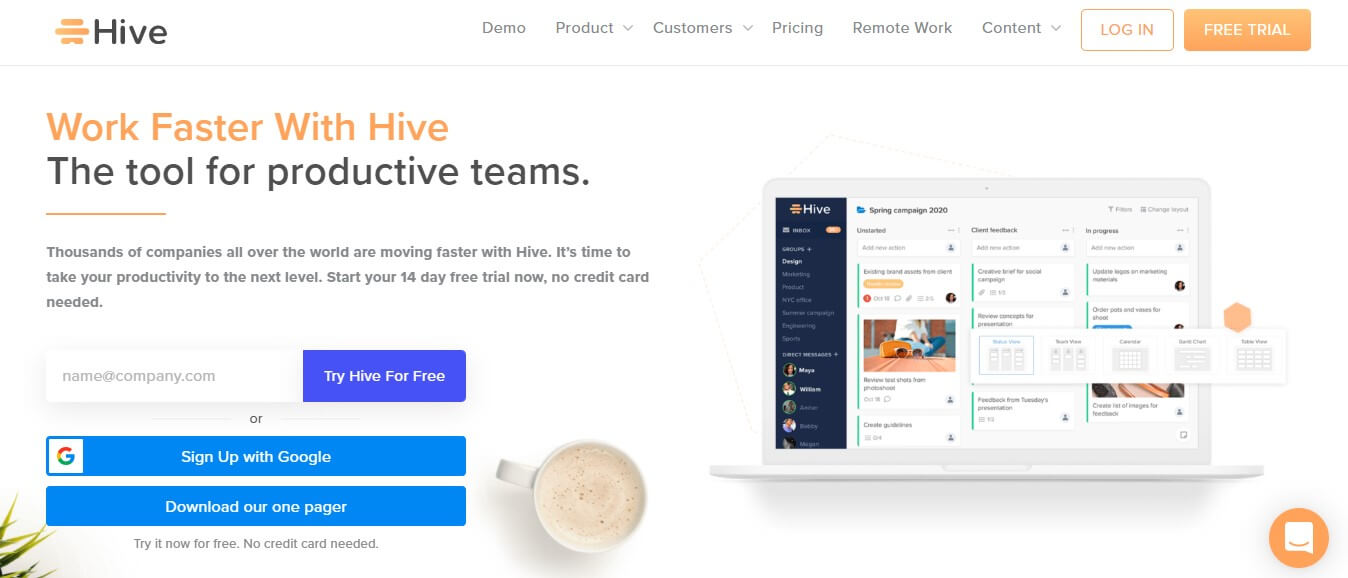
14. Trello
For small teams, Trello is a great option. It is a Kanban board-based tool. Everything you need to work on is present in the form of cards. You can organize everything into different phases. Trello allows collaborative work where you can invite team members to work on the project. One of the most significant drawbacks of Trello is – to manage multiple projects you have to create and manage multiple boards. However, Trello is a simple solution for smaller projects.
15. Todoist
Todoist is an enhanced to-do list. It is a good option for individual use. For small teams looking for a minimal solution, Todoist perfectly fits the bill. One can easily use it as a campaign management tool. Todoist comes with a point system called “Karma.” Here, Karma is simply the points you get by completing the tasks. This system allows teams to get their work done and acquire more Karma points. The basic version of Todoist is free and supports up to 80 projects.
16. Microsoft To-Do
A very simplified version of Todoist would be Microsoft To-Do. It is a free service for individuals. Small teams can also leverage this. However, where Microsoft shines is with its integration capabilities. To-Do can integrate seamlessly with Microsoft products and services such as emails, calendars, and more. It also has collaborative capabilities. Using third-party services, it can integrate with a ton of other collaboration tools, including Todoist, Trello, Asana, Gmail, Outlook, and more. So, for individuals and small teams looking for a simple campaign management tool, To-Do can be a good option.
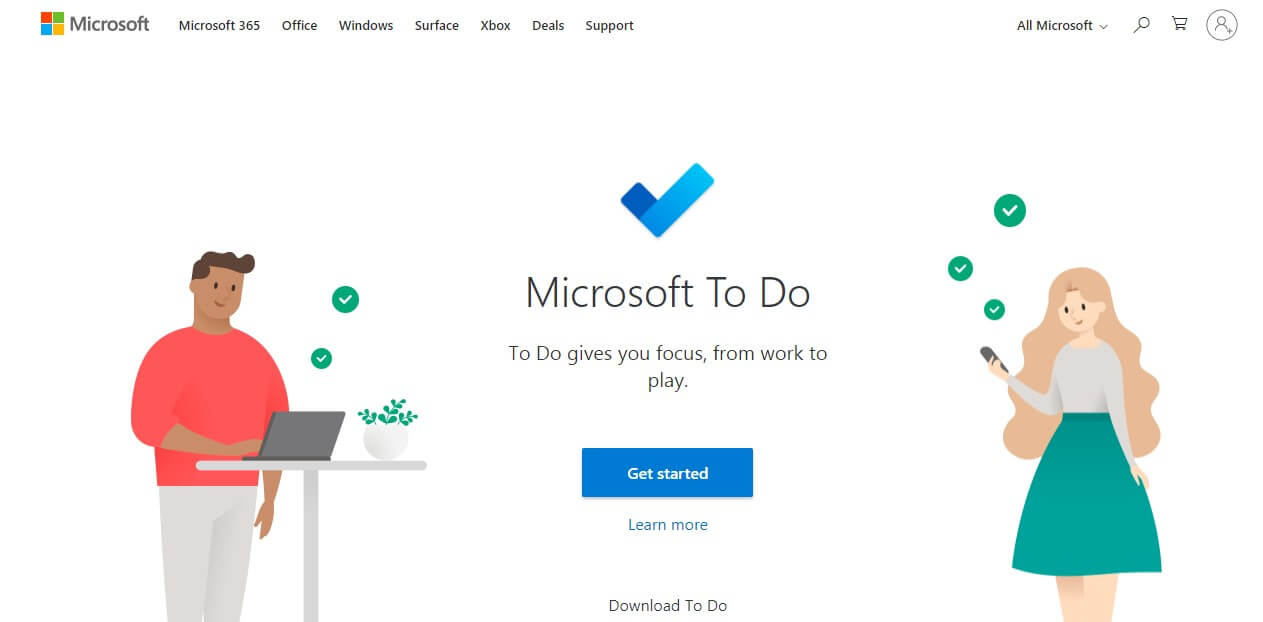
17. Asana
Asana is an intuitive and easy to use project management tool. It offers a web and mobile app to help teams organize, track, and manage their work. It is a simple and visually appealing tool with a straightforward setup.
18. Casual
While most project management tools are focused on scheduling, Casual is more workflow focused. It is a visual tool that helps users to understand the sequence in complex workflows. For those who are new to the project management scene, this is an option that one should consider.
19. Monday.com
Monday.com is a great looking piece of software with a lot of sophistication under the hood. This program is mainly known for its advanced scheduling capabilities. Monday.com can act both as a project management platform as well as a communications hub. The neat, collaboration-first interface makes it a popular choice for larger teams that often have individuals who are not familiar with sophisticated software.
20. ProjectManager
As the name suggests, ProjectManager is a project management tool. If anyone is looking for more traditional solutions, then ProjectManager is sure to appeal to them. ProjectManager will be effortless to use for those that have used conventional project management programs such as Microsoft Project.
Analytics
Analytics tools are an essential class of campaign management tools to see how well your campaign has performed.
21. Google Analytics
Google provides a marketing and analytics tool to check the digital presence of your business. Using Google Analytics, you can see how users visit your websites and what they do there. You can integrate Search Console, Google Ads, and Google Tag Manager with analytics to get a holistic view of your Google campaigns.
22. Microsoft Clarity
Clarity is relatively new, and like Google services, it allows you to explore heatmaps and optimize your website. Clarity is available free of charge. With Clarity, you can see user sessions, where users get stuck, get insights on user interactions, and more.
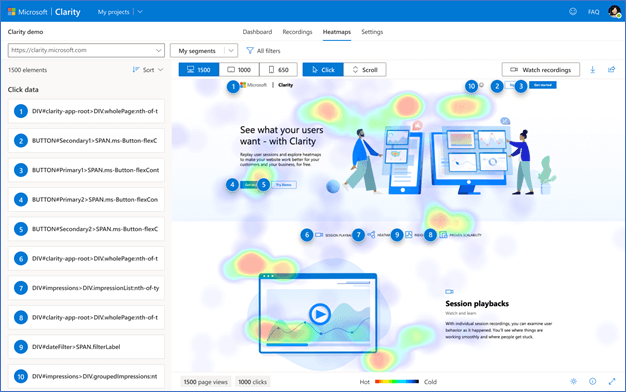
23. Domo
Domo is a data visualization tool aimed to provide better insight. It can aggregate data from multiple sources and display that in an interactive dashboard.
24. MixPanel
For event tracking, one can use MixPanel. Events can be anything from clicks to purchases. For mobile apps, MixPanel can create push notifications.
25. Klipfolio
It is an online dashboard platform for building real-time dashboards. It helps you generate reports by tracking and measuring your preferred KPIs and metrics.
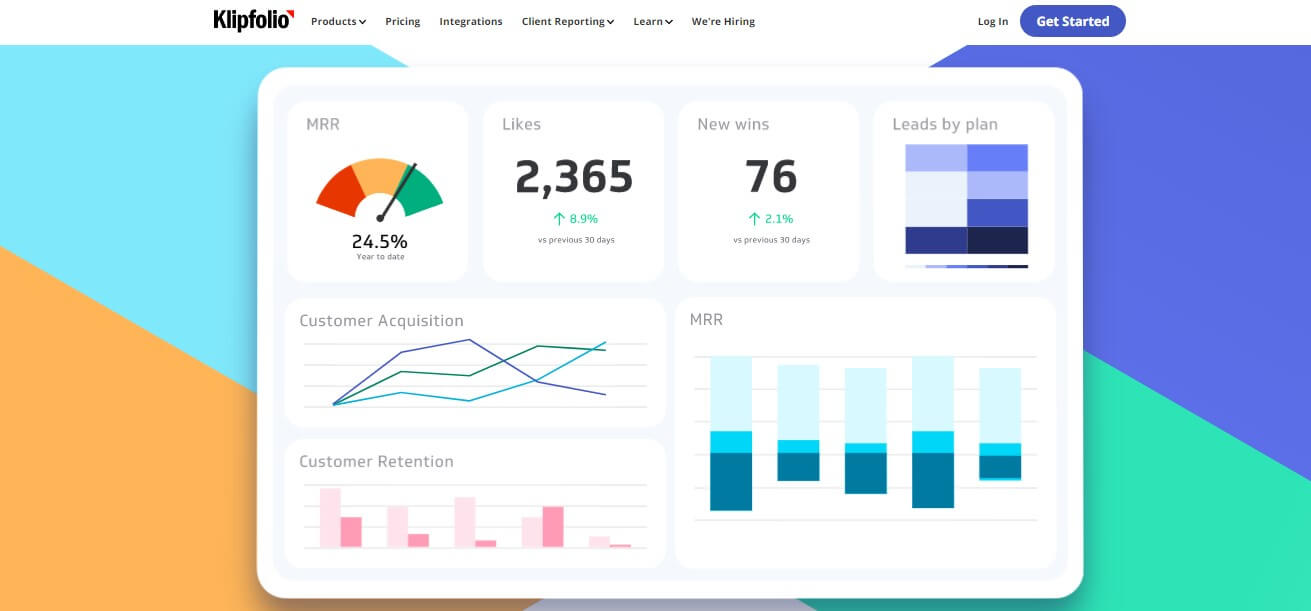
These analytics tools are great if you want to monitor your campaigns on only a few platforms. However, if the number of channels increases, then it becomes difficult to switch between platforms and judge what works best for you. Therefore, it is essential to be clear about the metrics that you want to track. You can also integrate your marketing channels in CRM software and watch the performance of each campaign. For instance, if lead generation is your goal, then you can track the amount spent on each campaign source, number of leads generated, conversion ratio, cost per conversion, and more.
Watch the masterclass on LeadSquared reports and analytics:
Social Media Tools
No campaign is ever complete without social media posts. 73% of marketers believe that social media marketing is crucial for brands. However, interacting with customers and prospects individually over different platforms is tedious. To maximize engagement and to track user interactions, here are some of the best campaign management and social media tools.
26. Hootsuite
Hootsuite is a comprehensive social media marketing dashboard that enables you to efficiently manage and schedule posts across various platforms, including Twitter, using its built-in tweet scheduler. You can easily manage posts on all platforms from a single dashboard, which will save you a lot of time.
27. SproutSocial
Like Hootsuite, SproutSocial is for creating, scheduling, and distributing posts. Once the social media post is live, SproutSocial can also analyze its impact.
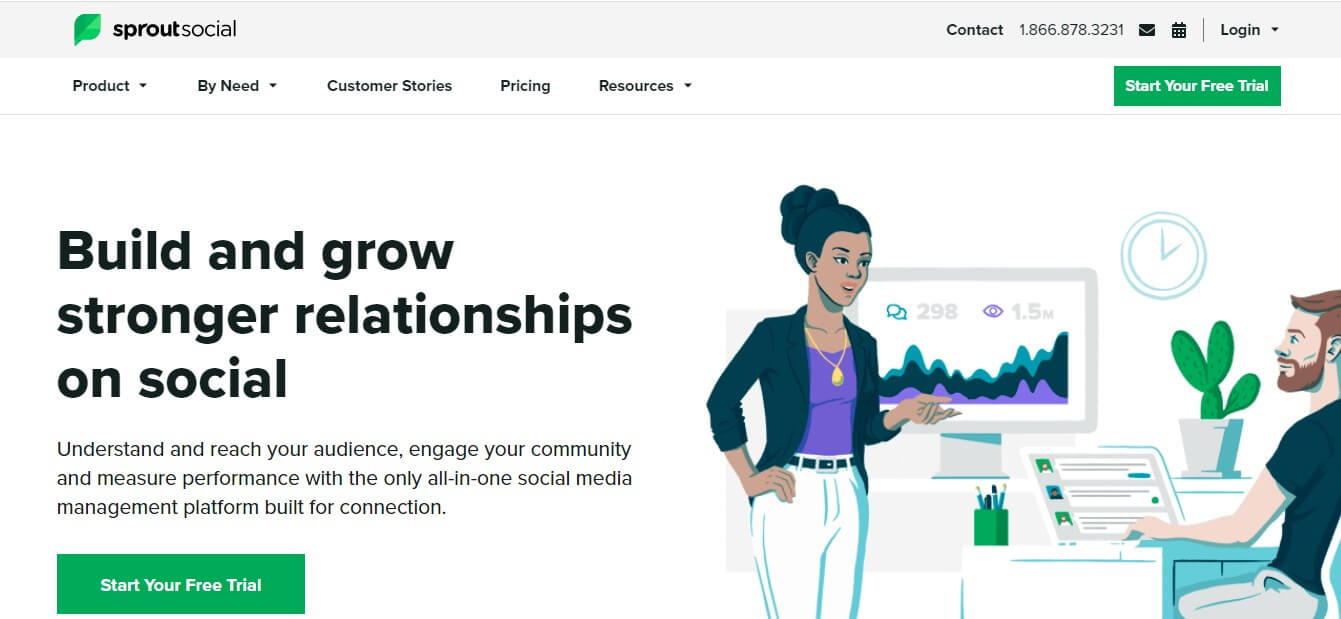
28. Later
For storytellers and visual brands, Latter is a good option. You can schedule content across a visual timeline and publish the content accordingly.
29. Planoly
Planoly works great with Instagram. It allows you to visualize your feed and get an idea of how things will look before you publish them.
30. FollowerWonk
FollowerWonk works well with Twitter, where you can dig through follower bios and see who they follow. It will allow you to understand how to optimize your marketing collateral.
31. BuzzSumo
If influencer marketing is a part of your campaigns, then BuzzSumo can be your go-to option. It lets you identify top influencers in your industry and find great content ideas.
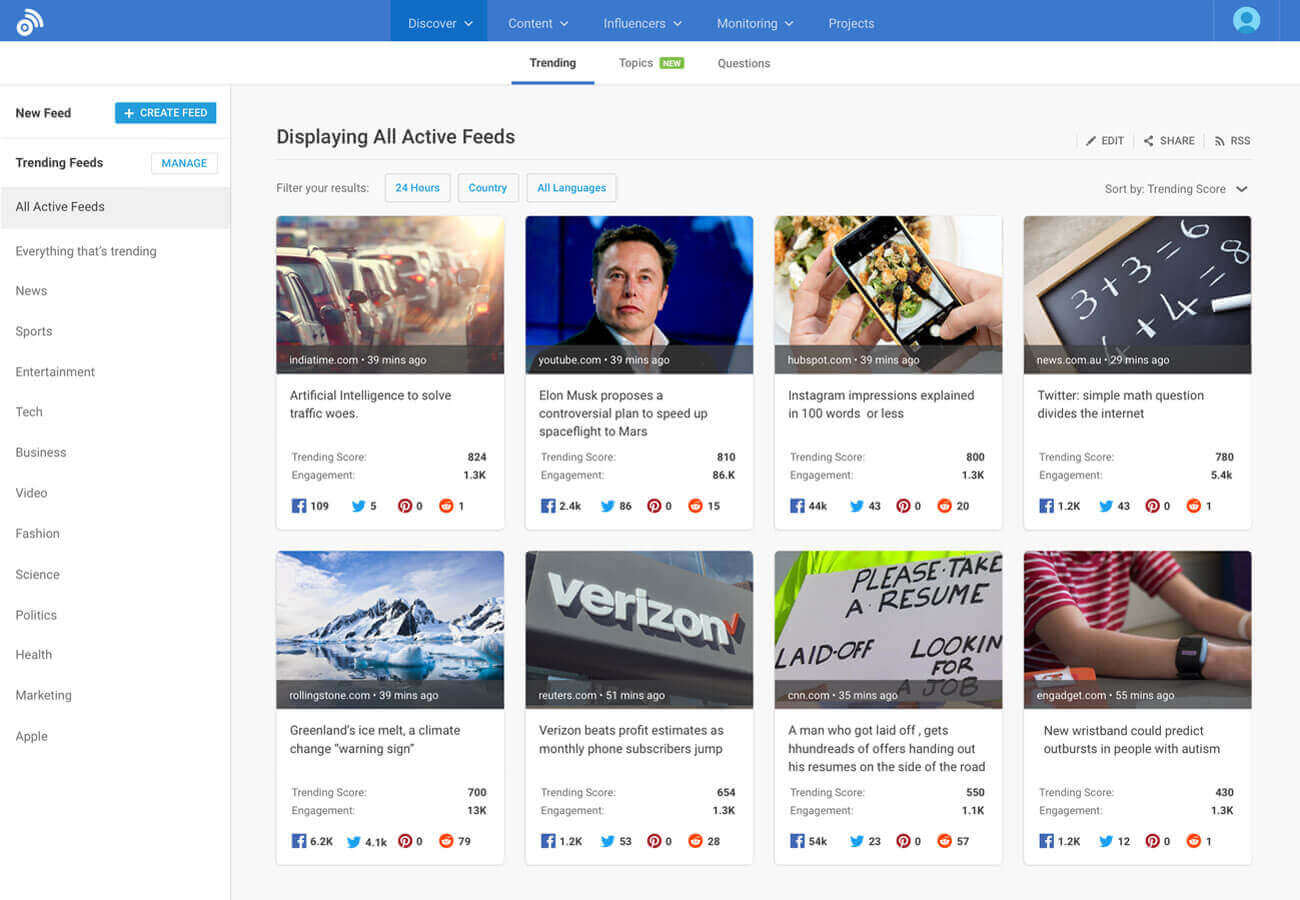
32. MeetEdgar
Consistency is the key to social media marketing. However, social media managers find it difficult to go online and post content according to the schedule. Many social media platforms don’t have the option to schedule posts for later.
MeetEdger resolves this challenge by letting you schedule posts on LinkedIn, Twitter, Facebook, and Instagram. It also mines your previous posts and shares them on your behalf (you can enable or disable this feature based on your preferences).
Choosing the best campaign management tools
The above list contains some of the most popular campaign management tools. However, every campaign has its unique requirements. It is the task of the campaign manager to find the right tools. There is a plethora of tools, both free and paid, that can help brands create a successful campaign.
In a nutshell, for effective campaign management, you will need the following tools:
- Email marketing automation
- Collaboration between marketing and sales teams
- Integration with other software and tools
- Facility to work offline
- Cloud storage and accessibility to prevent operational bottlenecks
- Customer journey mapping including post-sales support and feedback
- Brand perception and interaction history with leads and customers
- Automated task reminders and notifications
- Detailed analytics for teams, users, campaign sources, investments, and ROI
No matter what campaigns you run, and no matter what your goals are, you need a centralized platform to assess the performance of these campaigns in terms of the leads you generate, deals you close and the revenue you generate.
If you are looking for an end-to-end solution for managing campaigns, measuring performances, and syncing sales and marketing, then you must definitely give LeadSquared Marketing and Sales Execution Platform a shot.








